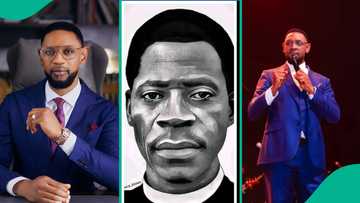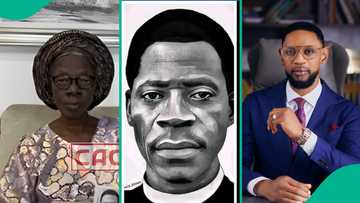Fatoyinbo vs CAC: Facts About Christ Apostolic Church Amid Controversy
- Pastor Biodun Fatoyinbo’s recent comments about Apostle Joseph Ayo Babalola have stirred controversy, prompting a strong response from the Christ Apostolic Church
- The remarks, seen as dismissive of CAC’s spiritual legacy, have reignited public interest in the Church’s origins and doctrinal foundations
- This report explores the historical journey of CAC from a humble prayer group to a global Pentecostal mission
A recent sermon by Pastor Biodun Fatoyinbo, the Global Senior Pastor of the Commonwealth of Zion Assembly (COZA), has ignited a wave of backlash from the Christ Apostolic Church (CAC) and the wider Christian community in Nigeria.
In the now-viral video, Fatoyinbo described the late Apostle Joseph Ayo Babalola—CAC’s revered founder—as “anointed… so anointed,” but claimed that “all the grace just went like that” because he “had no money.”

Source: Twitter
He further asked, “Where are his children?”—a remark the CAC deemed “mocking, insensitive, and ill-informed”.
The CAC responded with a strongly worded statement, signed by its Director of Publicity, Pastor Ade Alawode, condemning the implication that ministerial success is tied to material wealth. The church clarified that Apostle Babalola lived in a “befitting home,” drove one of the best Ford Jeeps of his time, and was honoured by colonial authorities during Queen Elizabeth II’s visit to Nigeria in 1956.
Fatoyinbo has since issued an apology, :
“I apologize if any other statement made by me has caused any form of distress, hurt or discontentment to the CAC, the family of the late Apostle Babalola or his associates. I will never disrespect or speak of them in that manner either publicly or privately”.
Christ Apostolic church history: From prayer group to global mission
The Christ Apostolic Church’s roots date back to 1918 in Ijebu-Ode, Ogun State, where a group of devout Christians—mostly members of St. Savior’s Anglican Church—began meeting for prayer outside formal church settings. Founding members included Mr J.B. Sadare, Mr D.O. Odubanjo, and Oba I.B. Akinyele. They were later joined by Miss Sophia Odunlami, whose ministry was marked by miraculous signs and healings.
The group, known as the “Precious Stone Society,” gained prominence for its intercessory prayers and spiritual fervour. They established contact with Pastor A. Clark of the Faith Tabernacle in Philadelphia, USA, receiving doctrinal materials that deepened their faith. However, their strict beliefs—particularly in divine healing and moral purity—led to a break from the Anglican Church.

Read also
Christ Apostolic Church schools Pastor Biodun Fatonyinbo over what he said about Ayo Babalola
The 1930 revival and the rise of Apostle Babalola
The turning point came in 1930 with a revival at Oke Ooye, Ilesa, led by Joseph Ayo Babalola. The revival was marked by extraordinary miracles, including the reported resurrection of a boy dead for four days. Babalola’s ministry drew mass attention, prompting him to seek a church base for the converts. He joined forces with the Faith Tabernacle leaders and later reached out to the Apostolic Brothers in Bradford, England.
On 23 September 1931, three English missionaries—Pastors D.P. Williams, W.J. Williams, and A. Turnbull—visited Nigeria and ordained seven pastors, including Sadare, Odubanjo, and Akinyele.
By 1940, doctrinal disagreements over the use of medicine led to a split. The Nigerian group, led by Odubanjo and Akinyele, opposed medical intervention, while Pastor S.G. Adegboyega supported it. Seeking a distinct identity, the group adopted the name “Apostolic Church,” later modified to “Christ Apostolic Church” to avoid confusion with a commercial entity.
The Church’s liturgy is characterised by African rhythm, hand-clapping, dancing, and fervent prayer—earning it the nickname “Aladura,” meaning “praying Church.”

Read also
2027 elections: “I have no apologies,” Drama as Nigerian governor declares support for Tinubu
Christ Apostolic Church administrative structure
The CAC is governed by the Supreme Council, chaired by the President of the Mission. The Church is organised into District Coordinating Councils, District Councils, and Assemblies, each led by designated officers. The Standing Committee of the Supreme Council handles urgent matters, while the General Council meets annually to review departmental reports.
Despite the recent controversy, the legacy of Apostle Joseph Ayo Babalola remains deeply revered. His ministry, marked by spiritual power and humility, laid the foundation for one of Nigeria’s most influential Pentecostal movements. The CAC continues to uphold his vision, rooted in prayer, holiness, and unwavering faith.
CAC schools Fatoyinbo over what he said about Babalola
Legit.ng earlier reported that the Christ Apostolic Church (CAC) has responded to Pastor Biodun Fatonyinbo of the Commonwealth of Zion Assembly (COZA).
The flamboyant COZA pastor had allegedly said revered revivalist, Apostle Ayodele Joseph Babalola, was poor despite the anointing he had.
Source: Legit.ng



